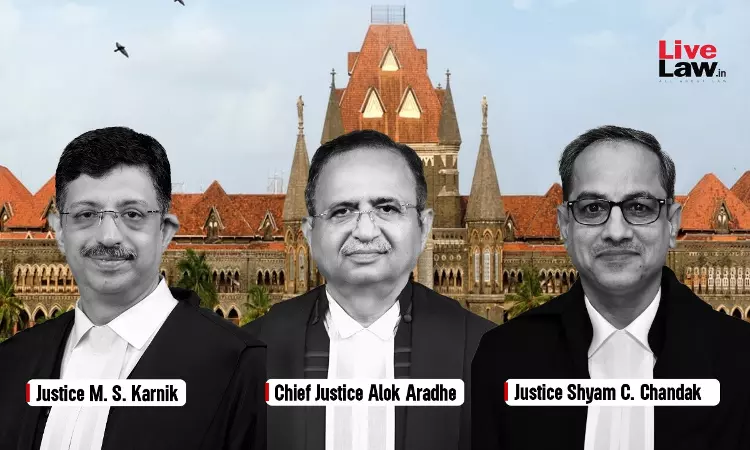- Home
- /
- High Courts
- /
- Bombay High Court
- /
- Order Granting Or Refusing...
Order Granting Or Refusing Temporary Injunction Is 'Discretionary', Not Adjudication On Subject Matter Or Merits: Bombay HC Full Bench
Sanjana Dadmi
29 April 2025 11:15 AM IST
The Bombay High Court has observed that an order of temporary injunction is not a prima facie adjudication on the subject matter or merits of the case, but an exercise of discretion by the court.The Court did so while answering a reference between conflicting decisions of division benches of the high court in Colgate Palmolive Company & Anr vs. Anchor Health And Beauty Care Pvt. Ltd...
The Bombay High Court has observed that an order of temporary injunction is not a prima facie adjudication on the subject matter or merits of the case, but an exercise of discretion by the court.
The Court did so while answering a reference between conflicting decisions of division benches of the high court in Colgate Palmolive Company & Anr vs. Anchor Health And Beauty Care Pvt. Ltd (2005) and Parksons Cartamundi Pvt. Ltd. vs. Suresh Kumar Jasraj Burad (2012) as well as Goldmines Telefilms Pvt. Ltd. vs. Reliance Big Entertainment Pvt. Ltd. & Ors (2014).
In Colagate case, it was held that an order passed on the application for temporary injunction does not cease to be an order passed in discretion merely because the Trial Court did not find any prima facie case. Whereas, in Parksons and Goldmines, it was held that order passed on the application for temporary injunction is prima facie adjudication and not an exercise of discretion.
A division bench of the Court on 15 December 2014, noticing conflicts between the above decisions, had referred the matter for consideration to a larger bench on the following issues: (i) Whether order passed on an application for temporary injunction is prima facie adjudication and not an exercise of discretion (ii) Scope of appeal from an order of the trial court on an application of injunction.
The facts leading to the order of reference is that the appellants had filed a suit for infringement of copyright and passing-off against the defendants along with application seeking ad-interim injunction. The Trial Court rejected the said application and thereafter, the appellants challenged the order of rejection in an appeal before the High Court.
Before the division bench, the appellant submitted that, in an appeal from order refusing to grant injunction, the scope of inquiry is not restricted only to examine whether the impugned order is perverse or suffers from errors apparent on the face of record but the impugned order can be examined in all its aspects. On the other hand, the respondents submitted that the court dealing with a prayer for injunction, exercises its discretion while granting or refusing to grant the injunction.
In the present reference, a full judge bench of Chief Justice Alok Aradhe, Justice M. S. Karnik & Justice Shyam C. Chandak analysed the three factors to be considered for grant of temporary injunction: where there is a prima facie case, balance of convenience in favour of plaintiff and if irreparable injury would be caused if plea is disallowed.
Referring to various judgments, the Court noted that 'prima facie case' means that the court should be satisfied that there is a bona fide substantial question raised which needs investigation and decision on merits.
On balance of convenience, it noted that the court must determine, first, need to protect the plaintiff against the injury for which they cannot be compensated in damages recoverable if the uncertainty were to be resolved in their favour and second, the defendant's need to be protected against injury resulting from having been prevented from exercising their legal rights for which he would not be adequately compensated.
Lastly, the Court is then required to satisfy itself that in case a temporary injunction is not granted, whether the party seeking the same will suffer irreparable injury.
Noting that grant of ad-interim injunction is discretionary, it stated “A party is not entitled to an order of injunction as a matter of right. The grant of interlocutory injunction is a remedy which is discretionary in nature. However, such a discretion has to be exercised on the touchstone of trinity test viz. prima facie case, balance of convenience and irreparable injury.”
It held that the law in the Colgate case is the correct one, as an order of temporary injunction does not cease to be a discretionary order merely because the trial court refused did not find a prima facie case.
“The Division Bench decision of this Court in COLGATE PALMOLIVE COMPANY (SUPRA) sets out the correct principle of law. An order of temporary injunction does not cease to be a discretionary order merely because the learned motion Judge did not find any prima facie case and refused to grant interim restraint order. It correctly holds that in the matter of temporary injunction, the Court does not adjudicate on the subject matter or any part of it on merits and considers the application for temporary injunction in the light of well-known principles and exercises its discretion weighing all relevant consideration without any expression of opinion on merits of the matter.”
On scope of Appellate Court, the Court referred to a recent judgment of Supreme Court in Ramakant Ambalal Choksi Vs Harish Ambalal Choksi & Others (2024 LiveLaw (SC) 939), where it was observed that appellate court's discretion in vacating the interlocutory order should only be exercised if it is shown that the interlocutory order of the trial court was arbitrary, capricious, perverse, or contrary to established legal principles.
The High Court thus observed that an appellate court will not interfere with exercise of discretion of court of first instance and substitute its own discretion except where the discretion has been shown to have been exercised arbitrarily or perversely.
Case title: UTO Nederland B. V. & Anr. vs. Tilaknagar Industries Ltd
Click Here To Read/Download Order



